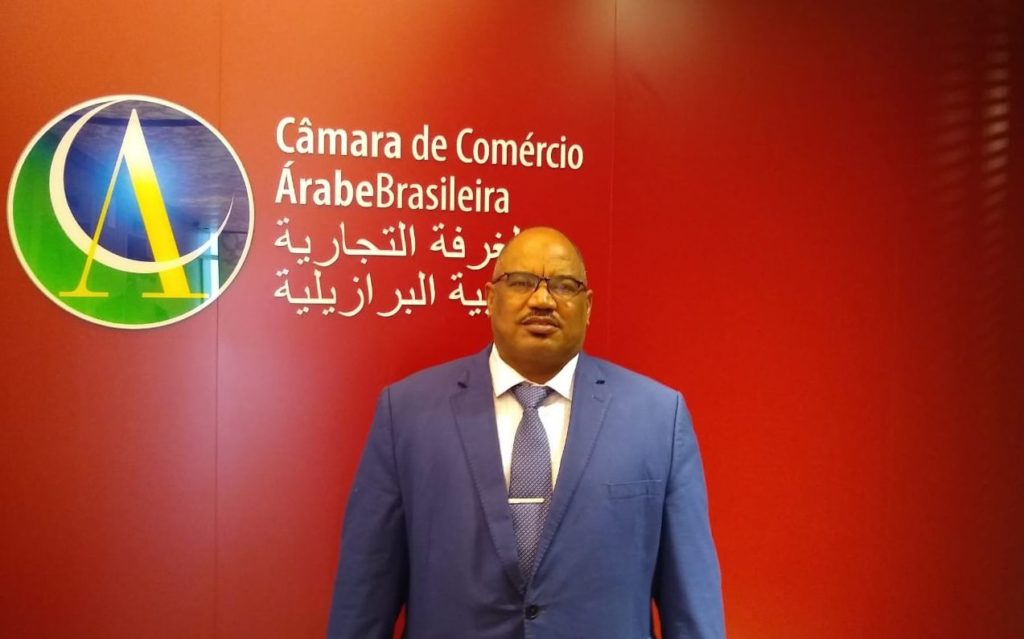São Paulo – Sudan is open for foreign investment from partner countries such as Brazil. The chargé d’affaires at the embassy of Sudan in Brasília, minister plenipotentiary Mohammed Elrashed Sidahmed Mohammed (pictured above), visited the headquarter of the Arab Brazilian Chamber of Commerce (ABCC) in São Paulo on Monday (10), and told ANBA that Sudan is ready to receive investment from Brazilian companies.
Sudan has come to the world’s attention as a destination for foreign investments since the United States lifted its economic sanctions against the country last year. Next week, on May 17, France will host an international conference to call on countries to support the Sudanese transition. The conference will put forward investment opportunities in Sudan due to the country’s untapped economic potential.

In his meetings in São Paulo, Elrashed discussed the Paris conference. It will draw the world’s attention to Sudan’s potential for investments. And investments are the Elrashed’s focus for Brazil-Sudan relations. The diplomat believes his country needs investments in many sectors such as energy, mining, infrastructure, roads, railroads, airports, and others. “Our doors are open for friendly countries, and Brazil is a very friendly country,” he said.
The Sudanese diplomat says Brazilian companies could set up businesses in the country and turn Sudan into a hub for the African countries. He says there’re opportunities in several sectors. Elrashed believes trilateral projects could be established in Sudan with resources from Arab countries and Brazilian expertise. According to the diplomat, countries such as the United Arab Emirates, Saudi Arabia, and Kuwait are ready to invest in Sudan.
During the meeting at the ABCC, the institution’s president Osmar Chohfi recalled the good relations between the two countries and the existing cooperation in sectors such as agriculture. He told Elrashed he can count on the ABCC to develop his mission in Brazil. The Sudanese diplomat has been in office for four months. Chohfi told Elrashed about the current structure of the ABCC and plans on setting up offices in Brasília, where the embassies are, as well as Arab countries such as Egypt and Saudi Arabia soon.

In the meeting, ABCC secretary-general & CEO Tamer Mansour gave an overview on Brazil-Sudan trade and the sectors where it could further grow. Brazil mainly exports sugar and agricultural machinery to Sudan, but Mansour believes it could also sell animal vaccines and medicines, tracking technologies for livestock and farming, more machinery, ceramics, ceramic tiles, cardboard, and pulp, as well as cosmetics. Brazilian exports to Sudan fetched USD 26.8 million last year.
On the other hand, Sudan mainly sells perfume plants to Brazil. Mansour believes the county could supply aluminum, copper, gum Arabic, and dates to Brazil, as well as more perfume plants. Sudanese exports to Brazil fetched less than USD 1 million last year. The ABCC’s secretary-general also sees potential for investment between Brazil and Sudan.
The appointments of the charge d’affaires in São Paulo were also attended by Sudan’s honorary consul in São Paulo, Mohamed Zoghbi, and Halal Service’s Marco Abdelaleim. Based on the meeting at the ABCC, a work plan will be developed to advance Brazil-Sudan economic relations.
Paris conference
The meeting that France will host next week will feature authorities such as Abdallah Hamdok, prime minister of Sudan; Bruno Le Maire, minister of Economy and Finances of France; Geoffroy Roux de Bezieux, president of the Movement of the Enterprises of France; Vera Songwe, executive secretary of the United Nations Economic Commission for Africa; and Hafez Ghanem, vice president for Eastern and Southern Africa of the World Bank. Leaders of countries willing to support the Sudanese transition are expected to attend. The conference will mark the launch of a Business Forum.
Information material on the meeting says the historical political transition in Sudan has opened new perspectives for the country, which is going through a series of reforms to reclaim its place in the international community and achieve sustainable growth. To support the economic growth, Sudan has signed agreements with the International Monetary Fund (IMF) and the World Bank, which are helping local authorities in drafting a new framework to manage public finances and the financial industry and improve the business environment.
Translated by Guilherme Miranda




